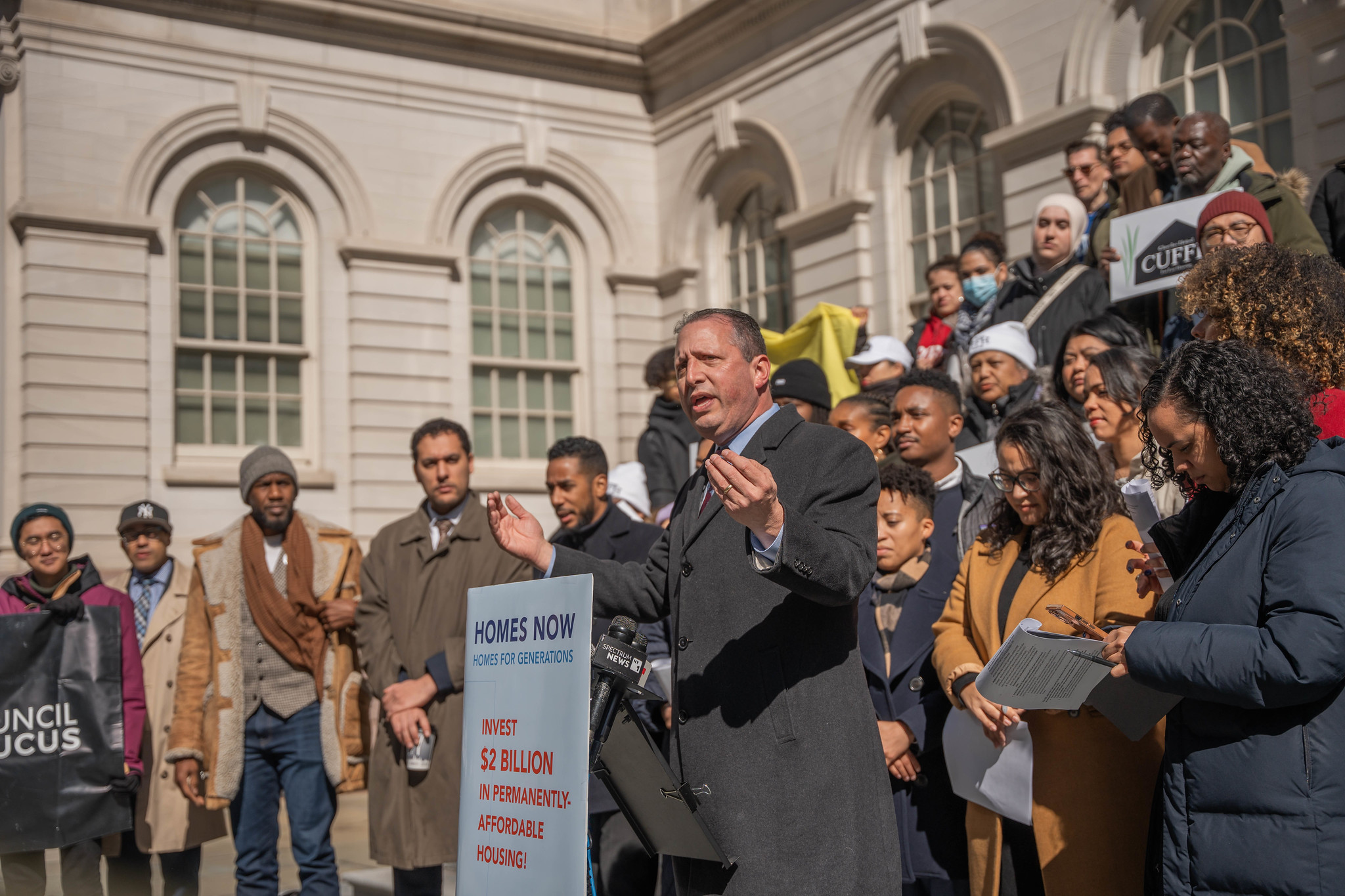
Homes Now, Homes for Generations campaign aims to quadruple City’s investment in affordable home ownership
The New York City Council Progressive Caucus today joined Comptroller Brad Lander, Public Advocate Jumaane Williams, the Association of Neighborhood and Housing Development (ANHD), Housing Justice for All, New York City Community Land Initiative (NYCCLI), the Professional Staff Congress of CUNY (PSC-CUNY), CIR-SEIU, UAW-9A, United Federation of Teachers (UFT), and dozens of grassroots housing organizations to launch Homes Now, Homes for Generations—a city-focused affordable housing campaign for the Fiscal Year 2025 budget cycle. City progressives joined forces in light of the worst affordability crisis New Yorkers have faced in decades—driven in large part by housing costs—to put forward common-sense investments in affordable home ownership and tenant protections.
The Homes Now, Homes for Generation campaign aims to quadruple the City’s investment in affordable homeownership (through investing in NYC Department of Housing & Preservation Development’s (HPD) Open Door program) and make good on the City’s promise from 2018 to prevent the displacement of tenants by preserving 7,000 rent-stabilized units (through revitalizing HPD’s Neighborhood Pillars Program).
“Cities like New York are cities of opportunity, and if we don’t provide spaces for people to come and live and stay—and stay for generations—then we’re failing. The market will never deliver homes at the affordability levels that low-income and working-class New Yorkers need, and the investments we call for in this campaign present an opportunity to permanently create and preserve homes for them, ensuring our city remains a city of opportunity,” said Council Member Pierina Sanchez, Chair of the Committee on Housing and Buildings.
“The greatest challenge for New Yorkers is how to afford living in New York City—and the number one expense is housing,” said NYC Comptroller Brad Lander. “As the city faces fewer and fewer units of available affordable housing and rising rents push more and more low-income and working class New Yorkers out of the five boroughs, the City must finance housing programs that will ensure generations of New Yorkers who have lived in and built New York City can stay here. We’re proud to launch the Homes Now, Homes for Generations campaign alongside the Progressive Caucus and a strong coalition of housing advocates, faith leaders, and labor because together, we can chart a path out of the housing crisis.”
While the Mayor has prioritized loosening zoning regulations, private market solutions alone won’t fix this crisis. The most powerful tool the City has to address the housing crisis is the ability to finance and preserve new, permanently affordable housing. This $2 billion, spent over 4 years, would lay the groundwork for the City to scale up its long legacy of permanently affordable housing. These two programs will create new homeownership opportunities for an additional 3,500 New York families and preserve and rehabilitate rent-stabilized units for nearly 7,000 households.
Background on Neighborhood Pillars
- HPD’s Neighborhood Pillars Program started in December 2018 and was intended to help affordable housing developers and community-based groups compete in the private real estate market.
- Neighborhood Pillars provides loans and tax exemptions so mission-driven organizations can rehabilitate and maintain rent-stabilized units at risk of deregulation as permanently affordable housing.
- The City put this program on the back burner in June 2019 and preserved less than 400 units since the program was launched in December 2018. Increased funding would scale this program back up to its original vision, which is to preserve nearly 7000 rent-stabilized units.
- The City should revitalize the program and update its term sheets to more effectively facilitate the removal for housing from the speculative marketplace, renovate, and retrofit units to improve living conditions, achieve climate goals, and put regulatory agreements in place to ensure ongoing affordability. For more on Neighborhood Pillars, see here.
Background on Open Door:
- The City currently finances very little homeownership – less than 1,500 units since 2017.
- Additional funding for new construction could create wealth-building opportunities especially for communities of color who have been historically excluded from homeownership.
- The city has existing models for multi-family homeownership development such as the Open Doors program; however, this program is currently funded at a minimal amount of $100M per year.
- We are proposing increasing the annual Open Door budget by four times, which would create new homeownership opportunities for an additional 3,500 New York families.
No comments:
Post a Comment